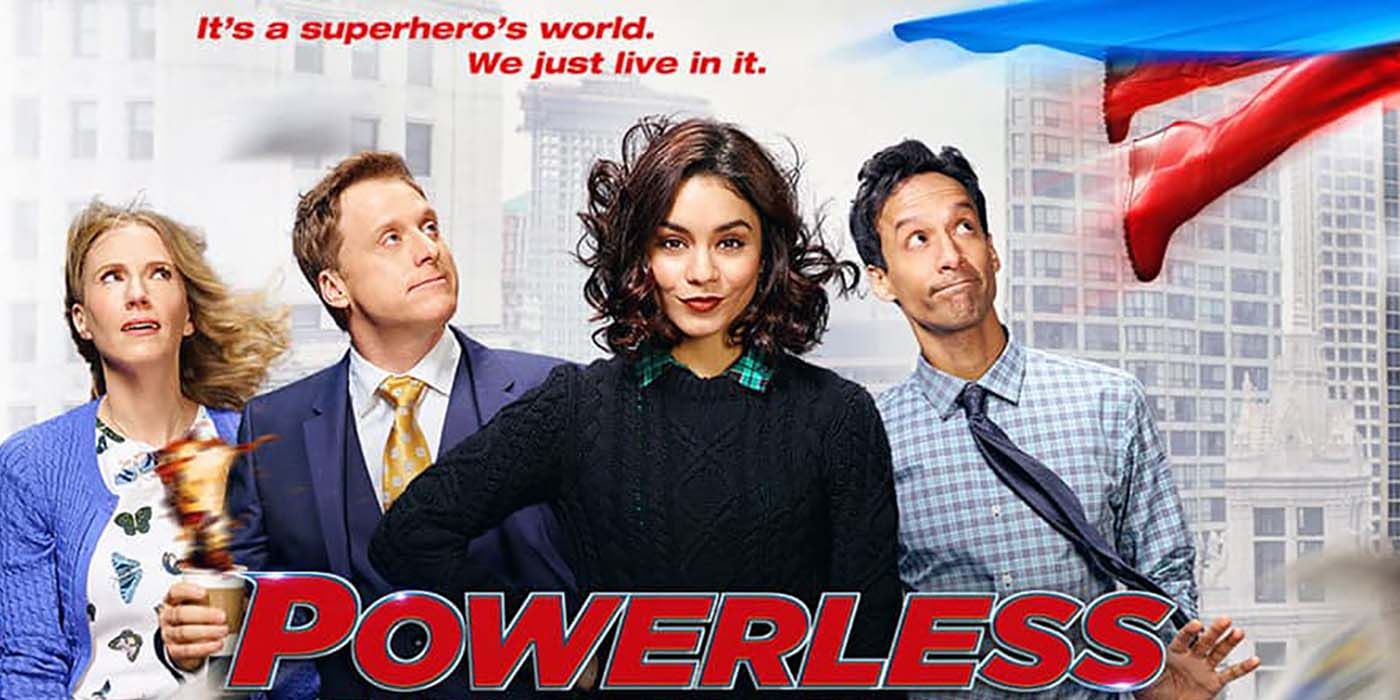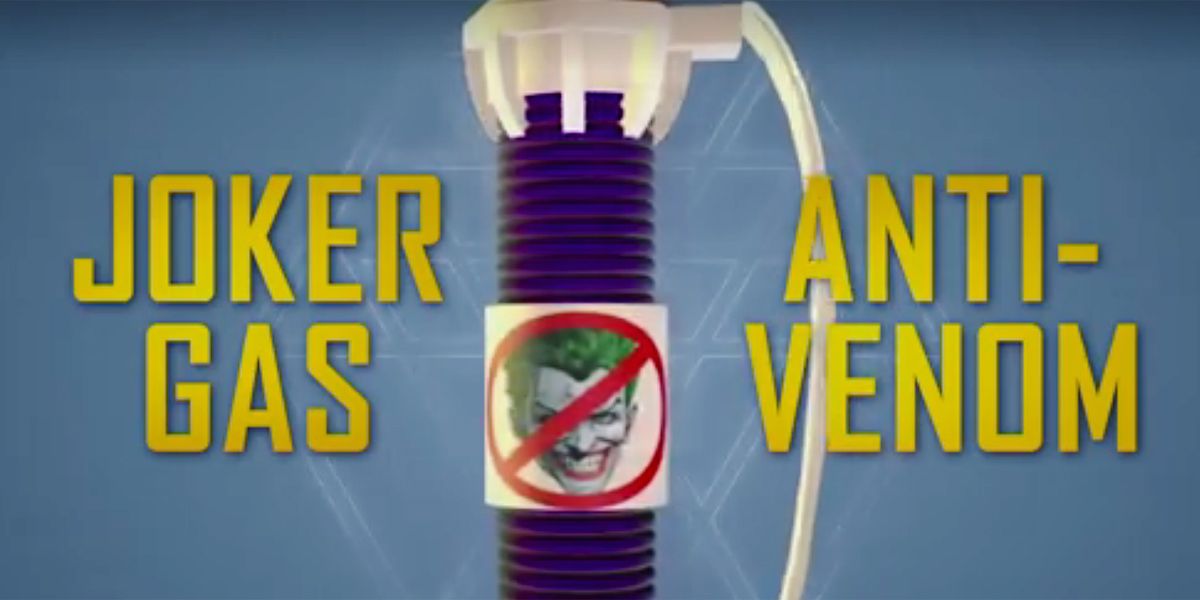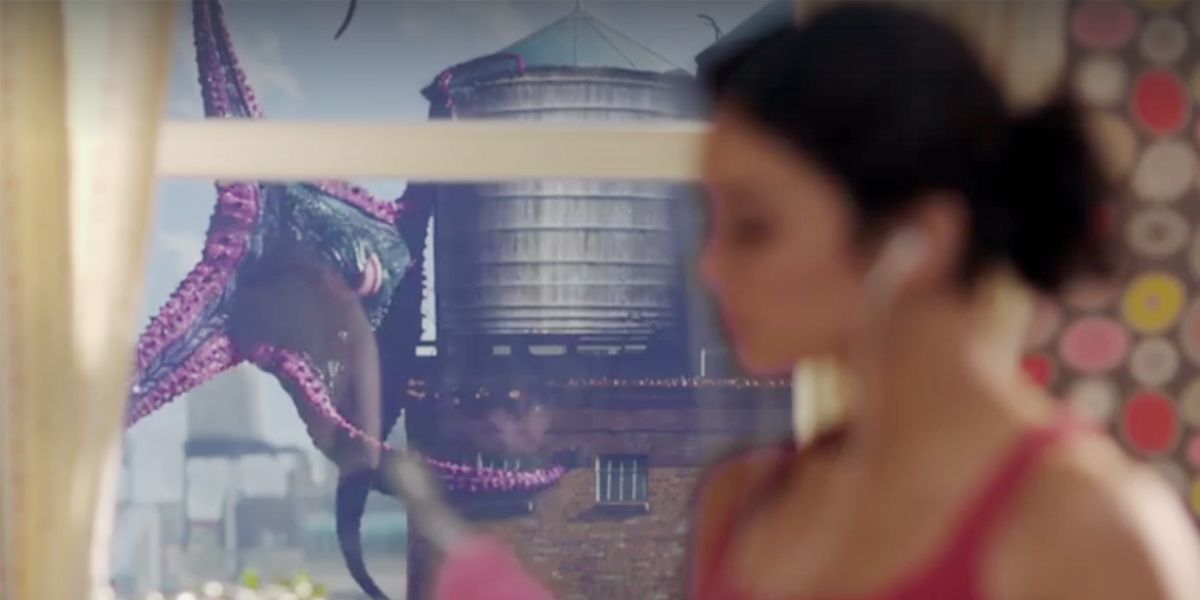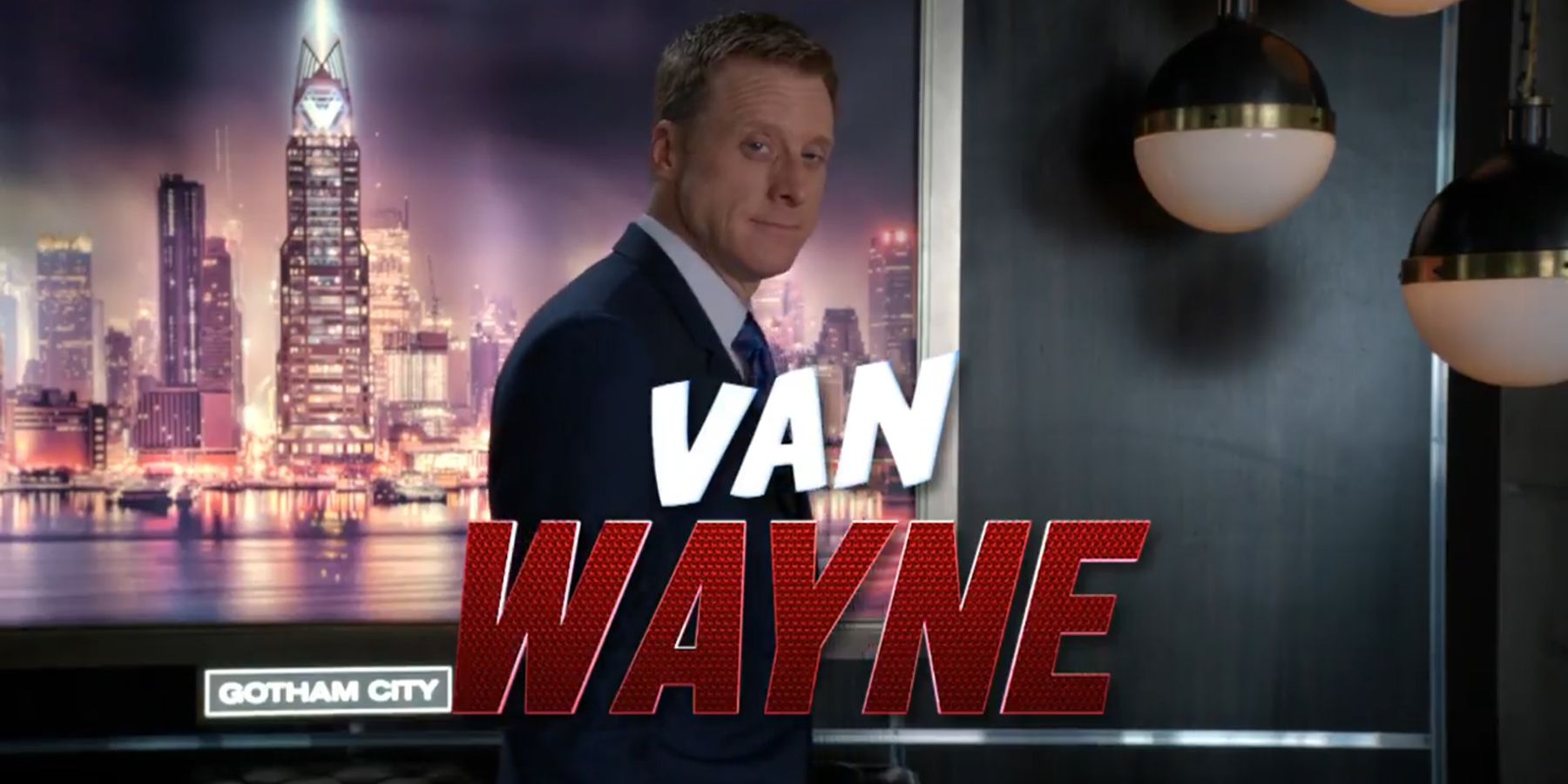As a lifelong comic book fan, writer-producer Patrick Schumacker has scored a dream gig: he’s one of the most powerful forces in the DC Universe. At least, he is on Earth-P.
Showrunner Schumacker, who’s past TV credits include “Cougar Town” and “iZombie,” has teamed with his frequent collaborator Justin Halpern (creator of the “$#*! My Dad Says” Twitter account and subsequent TV series) to take the helm of “Powerless,” NBC’s office-workplace sitcom set squarely in the confines of the DC Universe.
Or at least a DC Universe: “Powerless” takes place on the multiversal Earth-P, at an R&D wing of Wayne Security set in a metropolis called Charm City. A version of the pantheon of DC’s most famous superheroes – and many of its lesser lights – do exist in the reality, primarily to be played for laughs against the backdrop of the everyday office hijinks and mishaps.
Schumacker joined CBR for a deep-dive into the rules and philosophies the creators are employing as they mine hilarity out of the superheroic.
CBR: The show has such an interesting mashup of concepts, so let’s start with that: tell me how easy or challenging it’s been to match an office workplace comedy with the superhero environment of the DC Universe. Has it been easy to come up with stories that serve both premises?
Patrick Schumacker: Yeah. It’s a real small target to hit, I think – hopefully we do. We’re always trying to service the workplace comedy first, and really concentrate on our office characters, who are all mortal human beings, you or I. But then, pepper in as much of the DC fun as we can every episode, without it becoming reliant on that every week for sort of outside influences.
Every episode, storylines kick off for any number of reasons, with influences from the DC Universe. There could be a storyline where Wonder Woman has a nip slip while fighting whomever, and it becomes the water cooler discussion the next day and kicks off a conversation and storyline about gender inequality.
We also have an actual episode coming up – that other one was a hypothetical – where our company ends up landing the entire kingdom of Atlantis as a client, essentially. Their government officials come and visit our offices, because their security provider is up for review, essentially, after a giant Black Manta attack. Our R&D team has to pitch them on some new ideas.
Generally speaking, we are trying to service both the high-concept, and the more commonplace workplace comedy. Yeah, it absolutely has been challenging! You don’t want to lean too hard either way, and at the same time, you don’t want to make such a compromise that neither party is satisfied. You don’t want to try and shoot for like a four quadrant show that satisfies no one ultimately. So it’s a first season show. It’s a learning process.
We have an episode where the entire episode revolves around a superhero fantasy league. So in our world, the analog for Fantasy Football would actually involve superheroes, and it happens at a certain time of year, and the point system of course, all completely aping football, but it’s saves instead of TDs. Superman saving Lois Lane only counts as one point, because a particular victim only counts as one point – some weeks Superman only saves Lois Lane, and he’s not going to give you a bunch of points that week, so he’s kind of boom or bust. There’s like a whole logic that we had to kind of come up with regarding a superhero fantasy league.
We have an episode where there is a cold season happening, and cold season in our world is actually a time of year when all of DC’s cold-themed villains, of which there are many, descend upon Charm City and kind of wreak havoc. We kind of treat it as a sort of tongue in cheek-y weather pattern sort of thing, but it’s actually the entire city being frozen over because of Frostbite, Captain Cold, Killer Frost -- the list goes on and on and on.
So yeah, when we started trying to figure things out, we really just sat down and were like, ‘What would daily life be like for you or I living in a world where superheroes are there every day doing battle with super villains up in the sky, on the street level, etc, etc?” It generated a ton of ideas, which in turn, generate a lot of story areas. That said, if we get an idea that is super high-concept-y, and we absolutely love it, we’ll try and push it through. But if it’s not really servicing any sort of emotional through line with our characters that everybody can kind of relate to, sometimes we’ll have to shelve it.
You obviously knew the sitcom form and those kind of comedic setups very well, but how conversant with the DC Universe and the world of superheroes were you prior to this project?
I grew up reading comics. I was both a Marvel zombie and a DC fan. I’ve always been a massive Batman fan. I was born in 1980. I probably got into comics right around the time when Superman died and Image Comics was forming. Jim Lee’s “X-Men” got me into it, as it got a ton of people. So I’ve been pretty hardcore, both DC and Marvel, kind of off and on throughout my life. I may or may not have an “X-Men” tattoo. Probably shouldn’t say that out loud, considering I work with DC!
Of course, working on this show, I’ve ended up inundating myself with what [DC Comics] doing right now, with the Rebirth movement, whatever you want to call it, and that sort of reshaping of the DC Universe. I’ve gotten hardcore back into the comics. We were kind of working with DC on some other film and projects prior to taking over the show.
I’ve been kind of in the thick of it for quite some time. I don’t claim to be the encyclopedia of DC mythology that somebody like Geoff Johns is, but when Geoff Johns and Aria Moffly and Dan Evans over at DC are one phone call away, it’s basically like having that. Yeah, I’m pretty well-versed.
Tell me a little bit about finding a balance with the more popularly known superheroes that DC has versus like some more obscure characters. How do the arguments go when it’s like, “This joke’s funny if we reference Wonder Woman, but it might be funnier if we reference Crimson Fox?”
First off, we’re coming from a place of trying to exist within our own universe. It is the DC Universe, but we’re calling it Earth-P – it exists in a multiverse where the Greg Berlanti Arrowverse exists as well, and the Zack Snyder films exist, but they’re kind of all in their own separate universes within this umbrella multiverse.
So within Earth-P, there exists a city called Charm City, and we’re saying it’s kind of this Cleveland-sized kind of mini-Metropolis that is not necessarily the most desirable place to live, but it’s not bad. It’s like a nice place to raise a family if you’re going to live in a mid-sized city. I grew up in St. Louis. I kind of liken it to that.
The resident champion, sort of heavy hitter within Charm City’s confines is Crimson Fox. We like the idea that the city’s kind of an underdog city, that their resident champion is not the most powerful super-being in existence by a long shot, and that there is, much like the citizens of Charm City, kind of a chip on Crimson Fox’s shoulder as well for sort of being in the Justice League, but it’s Justice League Europe. She’s not necessarily ever going to get the call to join the A-team.
Especially in a comedy, we always liked the idea of using those more obscure DC characters, and hopefully bringing them to a wider audience. There was kind of a big philosophical conversation early on in the show about, “How do we treat superheroes in this world? Do we treat them as demigods living in their own bubble, but don’t really interact with our characters that much?” But they are kind of these pure, earnest, almost perfect examples of perfection that our characters, our mortal characters, can kind of look up to and either envy, or despise, or just want to be based on whoever our characters in the office are.
Or are superheroes, like Crimson Fox, more human, more flawed, and more self-aware that maybe they’re not Superman? The villains who frequent Charm City aren’t Darkseid. No one’s operating on like a cosmic level. I think we’ve been able to have our cake and eat it too, depending on who the hero is that we’re either referencing, or that we’re actually bringing into our world and having interact with our characters.
We’ve dealt a lot with the Global Guardians, so Crimson Fox being at one point a member of the Global Guardians is the first character that you’re going to see in the show, as you see right at the cold open of the new pilot, and Jack O’Lantern, who is actually been in the Global Guardians, [revamped] to be a villain, also makes an appearance right off the top. They’re sort of like our Joker and Batman for Charm City. Olympian also makes an appearance or two.
Right now, we’re actually writing a script where Fire – aka Green Fury, Green Flame, whatever you want to call her; we’re actually calling her Green Fury right now – even though she wants to be called Fire, nobody seems to get the hint – makes an appearance in a few episodes to actually round out the first season. We’ve cast somebody known for that. I don’t know if I’m allowed to say it, so I can’t right now. But she’s an exciting comic actress that people who are familiar with network television should be familiar with. So with that character, I think we’re trying to find a more of a comedic voice.
We don’t want to sell anybody out. We don’t want to completely reform characters, we don’t want to make fun of any of them. They are people that we should want to aspire to be. They are “better than us,” in the way that we look at professional athletes, or celebrities as better than us, but there are tabloids that kind of expose their foibles. There are derisive detractors that exist in the world that don’t like what they’re doing.
In the case of Crimson Fox, we have a character who’s kind of self-deprecating, who’s kind of very self aware, kind of a Booster Gold-like in the sense that she’s kind of aware of her branding. Our characters get into discussions about that and how, like, “Why do superheroes have uniforms? Or why do they have logos and that sort of thing? There’s kind of a cynical take from some of our comedic characters on why superheroes do the things that they do.
We like the idea of, yes, being able to reference any of the big seven in the Justice League. They exist within this world. But to actually have interactions in a pure comedy with a Crimson Fox, who is a little bit more self-deprecating, a little bit more of a comedic character in the way that we’re writing her, I think you have more license to do that with characters that aren’t quite as defined.
Everyone has an idea of Superman as this Boy Scout, this kind of pure hero, and I don’t think that necessarily works as well in the formula that we’re trying to create, as it would with someone that we have creative license to humanize even more and show those imperfections and flaws in a comedic light.
I’m also curious what your line is as far as meta references: do you want to line up Adam West and Lynda Carter to come in and guest star? Or Ezra Miller, or Grant Gustin? Or would that cross a line?
I don’t think it would. I would absolutely love to. Hopefully in success, we’re able to do do those sort of stunt casting ideas. We’re currently trying to get Adam to do some voice work for our pilot. The for-air version will hopefully, hopefully have Adam as the voice of Wayne Securities industrial videos and commercials. We thought that would be kind of a nice nod, and he’s doing some of the promotional stuff for the show…I don’t want to disappoint anyone, but hopefully that’s happening today. I think it’s going to happen. [EDITOR: West did provide the voiceover for the promotional video]
I think we would love to do the wink-y-wink cameo stuff whenever possible. We had in the current pilot - he was in the original pilot too, and we repurposed some of the footage they shot in the original pilot for a new pilot – the actor who played Jimmy Olsen in Richard Donner’s original “Superman,” Marc McClure. He actually stands in for Emily’s father in the pilot. So we already kind of start with some little Easter egg-y stuff that alludes to the films and other media that have existed, historically, for DC Comics.
But yeah, I love it. I would love it personally just as a fan. So if they’ll let us do it, I would have Jason Momoa show up next season as the Sparkletts guy. He’ll never show up as Aquaman. Ben Affleck will never show up as Batman. We can’t rule out that Grant Gustin could show up some other time playing somebody else, that there’s a little bit of a crossover. You have so much license, given the high-concept nature of this show, I think you have a lot of license.
The idea of a multiverse, I think, gives you license to have an actor from one of the other shows show up playing somebody different. Because who’s to say in this world that Barry Allen or Wally West – Barry Allen if it’s Grant – isn’t a courier? He doesn’t have any powers, necessarily. Or maybe he does, and we just never show it. Maybe he’s the FedEx guy.
Sounds like you guys are ready to have a lot of fun.
We’ve been having a blast making the show. It was tough going originally, because we were trying to redo a pilot while also doing 11 other episodes, kind of all at the same time. It was a giant workload, but now we’re kind of off and running. We’re locked on our pilot. Everybody seems pretty happy with it. Yeah, we’ve really only got four more episodes to kind of figure out the stories for, and some of them I’m really excited about.
If I could say one that’s maybe a pie in the sky but one that we would love to do if allowed: we have an episode that we’re calling “No Consequence Day,” which actually is a nod to the Richard Donner “Superman” film, the 1978 film, the ending of which is Superman flying around the world reversing the rotation of the Earth, and thereby turning back time. And it’s an idea where Lois Lane dies and one of our characters, Danny Pudi’s character, who happens to be kind of a little bit of a conspiracy theorist, it’s his understanding that this has happened before, and when Lois Lane dies, Superman actually turns back time, and therefore they have, oh, about eight hours to do whatever the hell they want.
So it just becomes a sort of wish-fulfillment fantasy episode. It was sort of a grounded wish-fulfillment fantasy episode that takes place in a world where turning back time is actually possible. That’s the kind of stuff that we would love to do. Whether or not we’re going to be able to go that high-concept-y remains to be seen. We want to make sure that it’s consistent with the world that we’ve set up. That’s, for us, the sort of ideal episode of “Powerless.” Hopefully we’ll be able to pull that off.




